What is cystic fibrosis (CF)
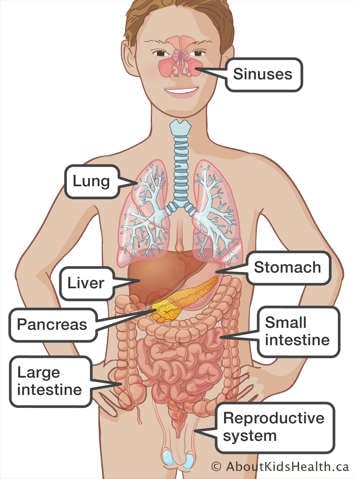
When many people think about cystic fibrosis (CF) they think about the lungs, but it can affect other areas of the body as well. CF is a disease that mainly affects the:
- respiratory system (lungs and breathing)
- digestive system (nutrition)
- reproductive system
Treatments to help keep people with CF healthy may include physiotherapy, exercise, medications and a healthy diet.
Affected systems
Respiratory system
The main organ for breathing is your lungs which are made up of lung tissue and airways. The airways are like an upside-down tree with the main windpipe or trachea being the trunk. The trachea then branches to the right and left (like big branches of a tree) and then keeps branching off into smaller and smaller airways. Finally, at the end, there are air sacs or alveoli, similar to the leaves on a tree. The air sacs play an important role in getting oxygen into your body and getting rid of carbon dioxide.
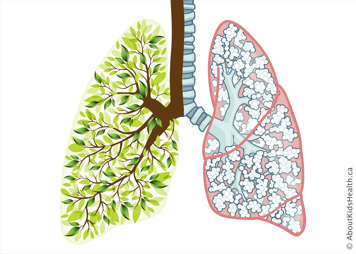
Normal mucus in the airways is thin and slippery. There are also little hairs called cilia that line the inside of the airways and their job is to work like a broom by sweeping up the mucus. The mucus, cilia and coughing help keep the lungs clean by removing dirt and germs from the lungs' airways. In people who have CF the mucus is sticky and clogs the airways. When the mucus gets stuck it can trap germs such as bacteria. Over time the amount of thick mucus can damage cilia and impact their function. This leads to chest infections and can cause coughing, difficulty breathing and difficulty exercising.
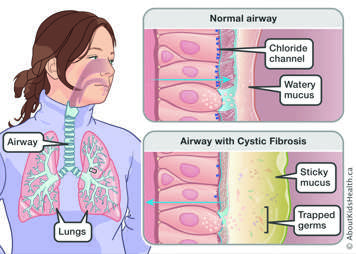
Digestive system
In the digestive system, mucus builds in the pancreas. The pancreas is an organ just below the stomach that makes enzymes to help digest food in the small intestine. The buildup of mucus blocks the small tubes that transport the enzymes from the pancreas to the small intestine. This results in the enzymes that are needed to break down food and absorb nutrients not reaching the small intestine. This can lead to poor nutrition and poor growth, which is also related to lung health. In the liver, the thick mucus can block the bile duct, causing liver disease.
Reproductive system
Women with CF still produce healthy eggs and many can get pregnant without any sort of treatment. Fertility problems in women can be related to their overall health, for example, if they are frequently ill due to infections or are underweight because of problems with breaking down food then their periods may be irregular or even absent. Women with CF may also have thicker vaginal mucus and this can make it harder for sperm to reach the egg.
Most men with CF have normal sperm production, but the tube that carries them from the testicle to the penis is missing or blocked. Men with CF can have biological children but they will need fertility interventions.
Signs and symptoms of CF
CF can affect every person differently. People with CF experience a variety of different symptoms including:
- difficulty gaining weight
- loose or oily stool
- daily cough
- decreased exercise ability
- chest congestion
What causes CF
CF is a genetic disease that a person is born with which means that it was passed on from the parents. It is caused by a change or mutation in the gene that produces the cystic fibrosis transmembrane conductance regulator (CFTR) protein. People who have CF inherit a copy of the mutated gene from each of their parents. Having two copies of the genetic mutation causes CF and this is due to chance.
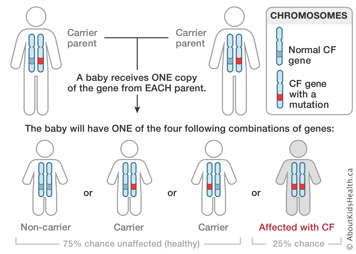
The mutation to the gene causes the CFTR protein that is produced to not work well. The job of the CFTR protein is to move chloride (found in salt) from the inside to the outside of a person’s cells. The movement of chloride helps to control the movement of water in the cells so there is a balance. The water follows the movement of the chloride and this keeps the mucus full of water or hydrated. If the protein is not working properly, the balance between the movement of salt and water is disturbed making the mucus much thicker and stickier.
Classes of CF
There are different classes of CFTR mutation, and which one you have affects the amount of functioning of the CFTR protein. Talk to your medical team to learn more about your type of cystic fibrosis. You can ask your health-care provider about what type of genetic mutation causes your CF and what potential treatments are available.
How CF is diagnosed
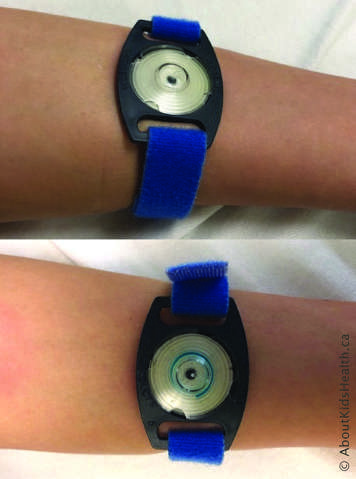
Cystic fibrosis is usually diagnosed when you are born. It is usually looked for through newborn screening programs where a blood sample from the baby is sent to a laboratory to check for a certain chemical that is made by the body. If the test is positive then more testing is needed at a specialized CF clinic to find out if the baby has CF or not.
The sweat chloride test is used to diagnose cystic fibrosis. This test measures the amount of chloride (salt) present in the sweat which indicates how well the CFTR protein is functioning.
There are cases where people are diagnosed later in life usually with milder forms of CF. They may start to show symptoms such as daily cough, difficulty gaining weight or oily poops.
Once someone has been diagnosed with CF then genetic testing is also done to help determine what type of genetic mutations are causing their cystic fibrosis. Genetic testing may also be done on other family members to screen if they also have CF or are carriers.
CF is diagnosed by a positive sweat chloride test and confirmation of two copies of the CFTR mutation from the DNA from blood samples.
How will CF affect me now?
Cystic Fibrosis can affect your lungs, digestive system and reproductive system. People with CF have thicker mucus in their lungs that require some help to move the mucus out of their lungs. Airway clearance or chest physiotherapy and often, nebulizations, are used to help keep the lungs healthy. Sometimes, oral or nebulized antibiotics are prescribed to fight lung infections.
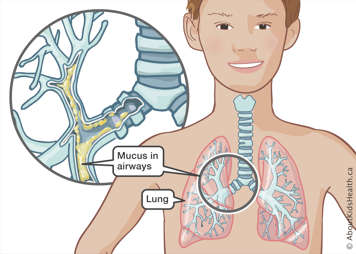
For some people with CF, they may need to take digestive enzymes to help them break down their food so that they can absorb the nutrients. Proper nutrition and physical activity are important to keep the bones healthy and help you grow. Close monitoring of liver health and the body’s ability to regulate sugar levels is also done through annual blood tests. When you reach puberty, you may notice that the timing for body changes may be a bit slower than your peers that don’t have CF.
Treatment of CF
There are different treatments available that can help you lead a healthy life. You will work together with your CF health-care team to put together a treatment plan that works for you. Different types of treatment include:
- airway clearance
- medications
- nutrition (enzymes, vitamins)
- exercise
It will be important to work with your CF health-care team and caregivers to understand and establish a routine for your medications, physiotherapy and exercise recommendations.
By following the recommended treatments, people with CF can live fulfilling and meaningful lives. Many of the treatments are done to help prevent getting infections and to maintain overall good health. For example, doing your airway clearance twice a day is like brushing your teeth twice a day. The breathing exercises help you to keep the mucus moving in your lungs and this helps to prevent a build-up of sticky mucus plugs which can make you sick. Another example is taking your enzymes (if required) to help you digest your food so that you get proper nutrition. It will also help to prevent stomach aches and bloating due to undigested food.
Infection control
To keep yourself healthy, make sure you practice infection control. To do this you need to wash or sanitize your hands, cover your mouth with your arm or tissue when you cough and stay away from people who have respiratory symptoms. It is also recommended that you do not hang out in person with someone else who has CF and always maintain a minimum distance of 6 feet if you are in the same area (such as the CF clinic) as another person with CF. This is to decrease the risk of getting or passing on germs or bacteria.






